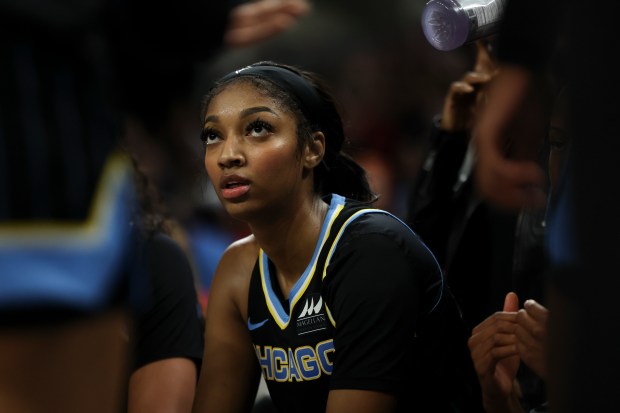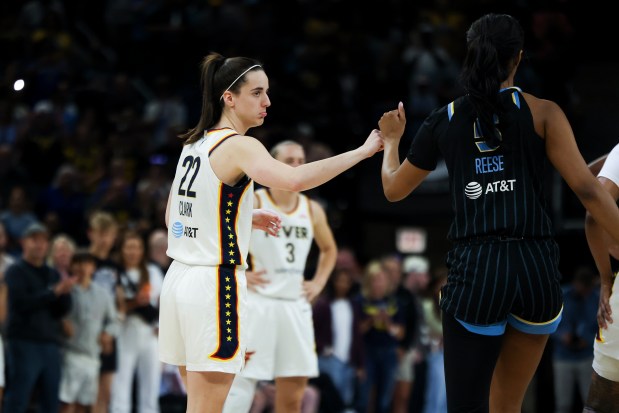WNBA Commissioner Cathy Engelbert failed the league Tuesday.
It was a softball question. During an extended interview on CNBC, anchor Tyler Mathisen asked Engelbert to address the “menacing turn” that WNBA fandom has taken while seeding racism and misogyny into everyday sports conversation.
Engelbert had an easy opportunity to address the racial abuse suffered by players such as Chicago Sky rookie Angel Reese, who has been a consistent target since joining the league — mostly at the provocation of her long-standing perceived rivalry with Indiana Fever rookie Caitlin Clark.
Instead, the commissioner shrugged the whole thing off.
“It is a little bit of that Bird-Magic moment … from 1979 when those two rookies came in from a big college rivalry — one white, one Black,” Engelbert said. “And so we have that moment with (Reese and Clark). But the one thing I know about sports, you need rivalry. That’s what makes people watch. They want to watch games of consequence between rivals. They don’t want everybody being nice to one another.”
Even setting aside the ignorance of Engelbert’s metaphor — the tenor of the rivalry between Magic Johnson and Larry Bird was racist, a fact both men acknowledged in their way — I was baffled by the flippant tone of the commissioner’s avoidance.
Being nice? What was she talking about? Does Engelbert even get what’s happening in this league?
Over the past four months of covering the WNBA, I have witnessed that “rivalry” and all of the ugly obsession that comes with it.
Every time I post a video of Reese on social media, it runs the risk of garnering enough traffic to also churn out dozens of violently racist responses. Photos of monkeys. Suggestions that Reese should kill herself. Threats to commit violent sexual acts against her. She has been called a bitch, the n-word, every slur a woman or a Black person possibly can be called.
This is, of course, just scratching the surface. Reese has described more drastic behavior. People have tracked down her home address, called her family members and approached her car in Chicago. Last week on her podcast, Reese detailed how some people created sexually explicit videos and pictures of her using generative artificial intelligence.
The abuse extends far beyond Reese. The morning after Chennedy Carter hip-checked Clark in the first game between the Sky and Fever, I woke up to a flood of more than 900 comments on a video I had posted to TikTok of a short media day interview with Carter.
They all followed the same blueprint: calling Carter “ghetto,” a thug, a man, telling her to watch her back. That was only a tiny percentage of the deluge Carter received on her personal social media accounts. And days later, a man waited for the Sky at their team hotel in Washington and attempted to confront Carter until team security escorted him away.
The same treatment followed Sky forward Diamond DeShields after another flagrant foul in the team’s last meeting with the Fever. DeShields was bombarded with hateful and racist messages — most upsettingly, spamming her with messages saying they wished the spinal tumor that almost took her life in 2020 had “done the job.”
Even the media can’t avoid the shrapnel of this bigoted vitriol. Over the past three years covering the Bulls, I have fielded plenty of frustrated, angry and downright rude emails and comments from fed-up fans. But this WNBA season is the first time I have regularly received misogynistic and homophobic slurs in my inbox, directing the same hate to myself and to the players on the Sky — always after I’ve written about the same player and team.
I’m tired of anyone acting like this is normal.
There’s a common refrain among detractors of the WNBA that goes something like this: “You guys wanted the attention. You wanted to be mainstream. This is what comes with it. Suck it up and deal with it.”
That’s a lie. A cruel one at that. I primarily cover the NBA. I know what normal looks like. I’m not pretending that male athletes don’t receive hate or harassment. Bulls players have told me about dehumanizing experiences — being harassed by bettors who lost money on a game, having their child threatened for cheering too loudly during a play-in tournament game.
But what is happening in the WNBA this season is distinct. It’s appalling. It’s violent. And it’s incessant — even in moments that should feel pedestrian.
At Wintrust Arena, the news conference room is located diagonally across the hallway from the home locker room. To access postgame media availability, players must walk through a lobby that also serves as the main route for courtside fans exiting onto Cermak Road. It’s a hectic, cacophonous atmosphere in which fans gather behind barriers in the hopes of snagging a picture or an autograph from their favorite player.
Last Friday, it felt less fun. Reese and Carter wrapped up a mostly cheerful news conference after a blowout win over the Los Angeles Sparks. But when Reese reached the door, she urged two security guards to keep the door closed with an audible protest: “There’s too many people.”
The rest of their conversation was hushed. Eventually Reese walked out, hustling quickly as both security guards shielded her from the crowd of fans who warmly greeted her arrival. Reese kept her head down, not stopping until she was safely through the double doors leading to the locker room.

That moment stuck with me. At work, Reese is indefatigably confident. She’s quick and sharp with the media, gregarious with her teammates, fearless almost to a fault on the court. But in that moment, the vulnerability of her position in the world shone through. It’s scary to exist in that precarious state — always wary, never able to show fear.
Social media isn’t real. That’s a line you’ll hear Reese say often — and it’s true. Logging off is an antidote tothe insanity fueled in online forums.
But players like Reese don’t have the luxury of disconnecting. Their online presence is key to their ability to secure major sponsorships and promotions, a cornerstone of WNBA player income as they remain limited by the league’s salary cap. And as public figures, this treatment often bleeds into real life — at the grocery store, on the court and everywhere in between.
Besides, for someone like Reese or Carter, online threats are real. They’ve already seen fans willing to cross the line. Social media isn’t real — until it is. And that constant fear of escalation is a reality dominating the league, regardless of whether Engelbert chooses to acknowledge it.
Hours after her on-air brush-off, Engelbert posted a curt amendment to her statement on X: “During a recent media interview, I was asked about the dark side of social media and online conversation about WNBA rivalries and race. To be clear, there is absolutely no place for hate or racism of any kind in the WNBA or anywhere else.”
During a recent media interview, I was asked about the dark side of social media and online conversation about WNBA rivalries and race. To be clear, there is absolutely no place for hate or racism of any kind in the WNBA or anywhere else.
— Cathy Engelbert (@CathyEngelbert) September 11, 2024
Maybe to Engelbert that felt like an apology. But it wasn’t. And it wasn’t even close to enough.
Lip service is the bare minimum. It doesn’t fix anything. It won’t change hearts and minds. It won’t dissuade racist behavior. But the least a commissioner can do is sit up straight on television and denounce the racial abuse of the players in her league.
Engelbert wasn’t speaking Tuesday to the people who harass and abuse players like Reese, Carter and DeShields. She was speaking directly to the 144 players who fuel this league’s success — the majority of whom are Black.
WNBA Players Association director Terri Carmichael Jackson emphasized this lack of direct dialogue in a statement released Tuesday night.
“This is not about rivalries or iconic personalities fueling a business model,” Jackson wrote. “This kind of toxic fandom should never be tolerated or left unchecked. It demands immediate action and frankly should have been addressed long ago.”
This is what Engelbert should keep fixed in the front of her mind when considering the relationship between fans and players in the WNBA. The league’s newfound popularity has been accompanied by unprecedented hostility — and that should be the commissioner’s primary concern.
Yes, business is booming. Games are selling out, broadcasts are breaking records. But this sport is nothing without the women who play it — and their safety cannot be the sacrifice in building future success.



